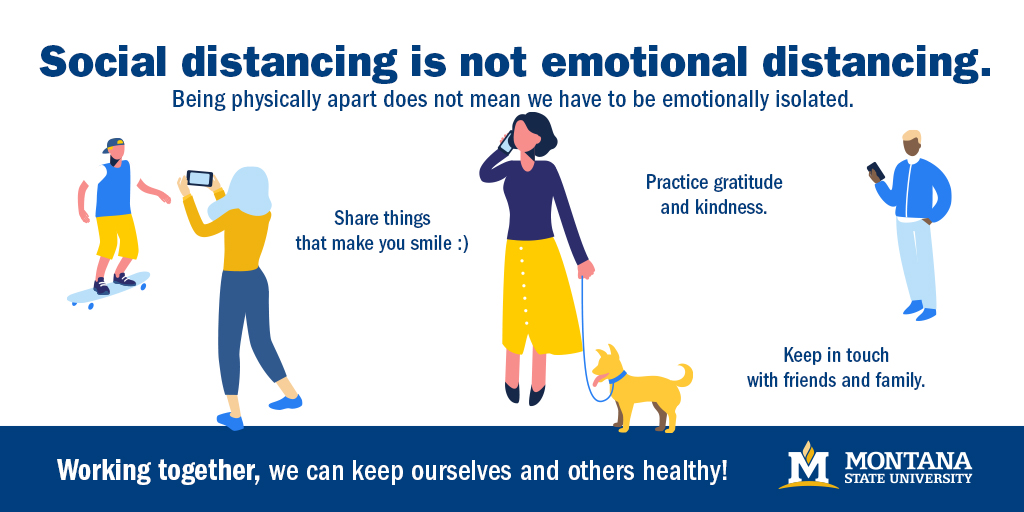Managing Stress and Anxiety
Coping with Stress and Supporting Mental Health During the COVID-19 Situation
For immediate help managing intense emotions or thoughts of suicide, consider contacting: The Bozeman Help Center: 406-586-3333 or The National Suicide Prevention Line: 1-800-8255 or text 741-741.

Feelings of stress and anxiety are common reactions to hearing of the COVID-19 situation. While such reactions are understandable, they can also impact mental and physical health. It is important to recognize stress reactions in yourself and others and be intentional about coping with stress in constructive ways.
Understanding Common Reactions
While everyone reacts differently to such a stressful situation, common reactions include:
- Anxiety and Worry about your own health
- Apprehension about school, work, and money
- Concern for the well-being of others
- Uncertainty or frustration about how long this situ-ation will go on, and about the future
- Difficulty concentrating
- Anger at the situation
- Symptoms of Depression, such as hopelessness, disruption in sleep, and changes in appetite
- Desire to use alcohol or drugs to cope
- Signs of acute stress, such as intrusive distressing memories, nightmares, being easily startled
- Be mindful of your assumptions about others. Some-one who has a cough or a fever does not necessarily have coronavirus. Self-awareness is important in not stigmatizing others in our community
Sources of Support
- Welltrack: Self-help app for students
- Counseling and Psychological Services: Call us at 406-994-4531 or learn more online at montana.edu/counseling.
Ways of Relieving Stress
- Keep things in perspective. Some anxiety is normal to experience. Educate yourself on risks and precautions, and recognize that media coverage may exaggerate some dangers.
- Get the facts by accessing credible sources such as:
- Connect with others. Maintaining social networks can foster a sense fo normalcy and are valuabe outlets for sharing feelings and relieving stress.
- Drink water and eat healthy foods.
- Laugh. Watch your favorie comedies, engage in activities that bring you joy.
- Avoid excessive use of caffeine and alcohol
- Prioritize getting enough sleep
- Exercise to the extent you are able. Get outside if possible.
- Engage in relaxing activities such as deep-breathing, yoga, pleasure reading, etc.
Download this letter in PDF format
Find additional tools for coping with the emotions that accompany the COVID-19 pandemic online from Counseling and Psychological Services.
